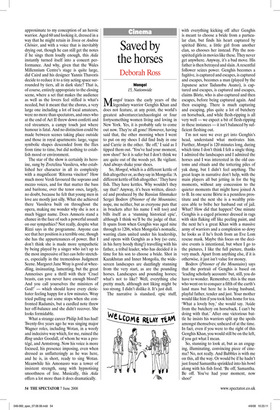Saved by the horses
Deborah Ross
Mongol
15, Nationwide Mongol traces the early years of the legendary warrior Genghis Khan and does not feature, at any point, the world’s greatest adventurer/archaeologist or four fortysomething women living and loving in New York. Yes, it is probably safe to come out now. They’re all gone! However, having said that, the other morning when I went to put on my shoes I did find Indy in one and Carrie in the other. ‘Be off,’ I said as I tipped them out. ‘You’ve had your moment, now shoo!’ So it is safer but I don’t think we are quite out of the woods yet. Be vigilant. And always shake your shoes.
So, Mongol, which is a different kettle of fish altogether or, as they say in Mongolia: ‘A different kettle of fish altogether.’ They have fish. They have kettles. Why wouldn’t they say that? Anyway, it’s been written, directed and produced by the Russian filmmaker Sergei Bodrov (Prisoner of the Mountains; nope, me neither, but as everyone puts that in brackets after his name I will too) and bills itself as a ‘stunning historical epic’, although I think we’ll be the judge of that. It spans from when Genghis was aged nine through to 1206, when Mongolia’s nomadic, warring clans united under his leadership, and opens with Genghis as a boy (so cute, in his furry hoody thing!) travelling with his father, a tribal leader, who has decided it is time for his son to choose a bride. Shot in Kazakhstan and Inner Mongolia, the widescreen landscapes are dazzlingly stunning from the very start, as are the pounding horses. Landscapes and pounding horses; what’s not to like? Well, everything else pretty much, although not liking might be too strong. I didn’t dislike it. It’s just dull.
The narrative is standard, epic stuff, with everything kicking off after Genghis is meant to choose a bride from a particular clan, but finds his heart captured by spirited Börte, a little girl from another clan, so chooses her instead. Pity the nonspirited girls in movies like these. They never get anywhere. Anyway, it’s a bad move. His father is then betrayed and slain. A resentful follower seizes power. Genghis becomes a fugitive, is captured and escapes, is captured and escapes, becomes a man (played by the Japanese actor Tadanobu Asano), is captured and escapes, is captured and escapes, claims Börte, who is also captured and then escapes, before being captured again. And then escaping. There is much capturing and escaping, plus quite a lot of butchery on horseback, and while flesh-ripping is all very well — we expect a bit of flesh-ripping in these instances — it isn’t balanced by sufficient fleshing out.
I’m not sure we ever get into Genghis’s head, understand what motivates him. Further, Mongol is 120 minutes long, during which time I don’t think I felt a single thing. I admired the landscapes and I admired the horses and I was interested in the old customs and rituals and the tottering piles of yak dung, but I didn’t feel anything. The great leaps in narrative don’t help, with the main players all but jetting in for the big moments, without any concession to the quieter moments that might have joined A to B. In one scene Börte is a penniless prostitute and the next she is a wealthy princess able to bribe her husband out of jail. What? How did that happen? One minute Genghis is a caged prisoner dressed in rags with skin flaking off like peeling paint, and the next he’s a great Khan with a massive army of warriors and a complexion so dewy he looks as if he’s fresh from an Eve Lom rescue mask. Maybe this focus on the decisive events is intentional, but when I go to the pictures, I like the full picture, thanks very much. Apart from anything else, if it is otherwise, it just isn’t value for money.
Bodrov (Prisoner of the Mountains) says that the portrait of Genghis is based on ‘leading scholarly accounts’ but, still, you do have to wonder. Remember, this is the man who went on to conquer a fifth of the earth’s land mass but here he is loving husband, playful father, tender and just. Your mother would like him if you took him home for tea. ‘What a lovely boy,’ she would say. ‘Aside from the butchery on horseback. I can’t be doing with that.’ After one victorious battle he insists his warriors split up the spoils amongst themselves; unheard of at the time. In fact, even if you were to the right of this Genghis Khan, you would still be on the left, if you get what I mean.
So, stunning to look at, but as an engaging, illuminating, convincing piece of cinema? No, not really. And Bubbles is with me on this, all the way. Or would be if he hadn’t just found Samantha sprinkled into his bowl along with his fish food. ‘Be off, Samantha. Be off. You’ve had your moment, now shoo!’










































































 Previous page
Previous page